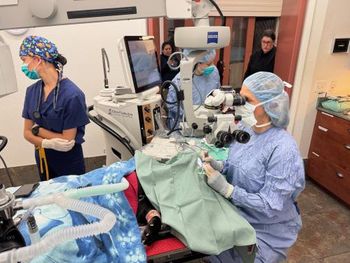
Hot Literature: Exploring equine fungal keratitis treatments
A look at how several antifungal agents and delivery vehicles affect equine keratocytes.
Tackling painful corneal ulcerations in horses is a common occurrence. Besides resident bacteria, the equine cornea and conjunctiva are home to various fungal organisms. When damage occurs to the cornea, the development of fungal keratitis is a real concern. These infections are extremely difficult to treat, and fungi can easily find their way deep into the corneal stroma.
Several topical treatments for fungal keratitis are currently used in equine veterinary practice. But there is little data on the effect of various antifungal agents and commonly used delivery vehicles on keratocytes themselves. Several ocular preparations were evaluated in a new study conducted by researchers at the University of Georgia’s College of Veterinary Medicine.
Healthy, cultured equine keratocytes were exposed to several dilutions of three topical antifungal preparations (natamycin, itraconazole, and miconazole) as well as corresponding delivery vehicles on their own (DMSO, benzalkonium chloride, and carboxymethylcellulose). Morphologic changes and cellular proliferation were assessed 24, 48, and 72 hours after application. The highest concentrations were designed to mimic the levels found in vivo, representing natural tear film dilution.
At the highest concentrations, all of the antifungals resulted in significant cellular changes and inhibited growth. Natamycin caused the most severe cellular damage even at low concentrations, and itraconazole had the least effect on the cells. All of the vehicles had minimal effect as compared with the antifungal agents except for carboxymethylcellulose (a combination vehicle), which caused severe damage at every concentration. DMSO, the delivery vehicle found in itraconazole preparations, was shown to have the least effect on cellular morphology and proliferation.
The drugs evaluated in this study were chosen for their clinical relevancy, and the concentrations were selected to reflect how these agents are diluted quickly when applied to the equine eye. The results suggest that there may be significant impairments to cellular repair or healing caused by commonly used topical antifungals. This may need to be a consideration when choosing a treatment protocol in cases of fungal keratitis. Further in vitro and in vivo studies are needed.
Mathes RL, Reber AJ, Hurley DJ, et al. Effects of antifungal drugs and delivery vehicles on morphology and proliferation of equine corneal keratocytes in vitro. Am J Vet Res 2010;71(8):953-959.
Link to abstract:
Newsletter
From exam room tips to practice management insights, get trusted veterinary news delivered straight to your inbox—subscribe to dvm360.




